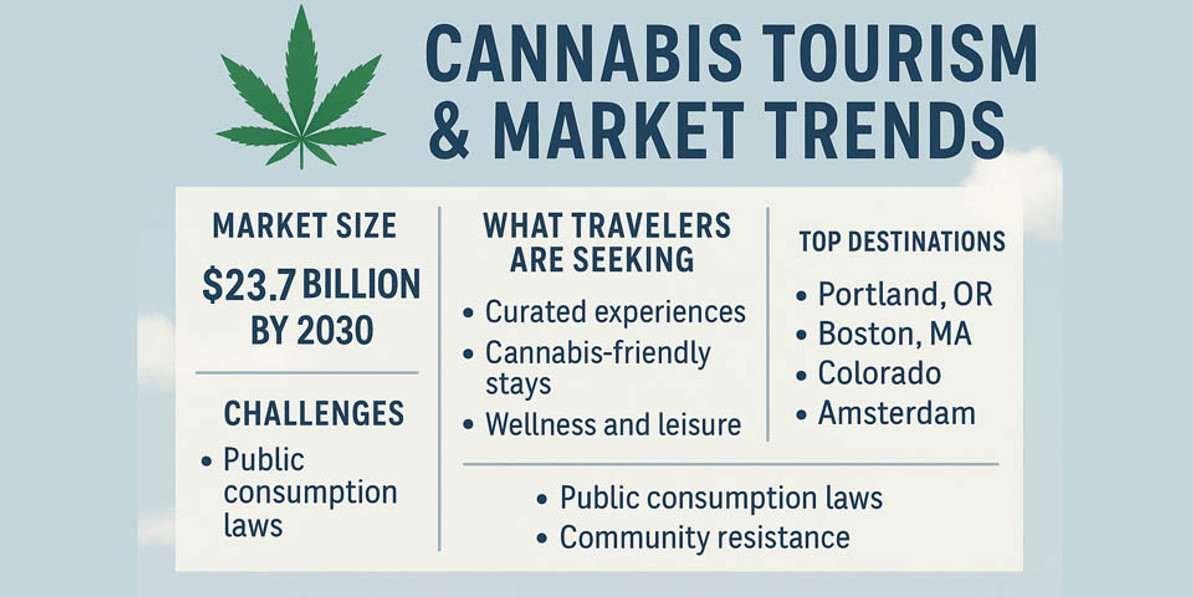Cannabis Tourism & Market Trends: Exploring Demand, Destinations, and Growth (July 2025)
Cannabis Market Trends Are Evolving in 2025
Cannabis tourism is moving beyond novelty and entering a growth stage driven by legalization, wellness travel, and immersive experiences. Whether you’re a travel operator, cannabis business, or curious adventurer, here’s what you need to know about this niche but fast-growing market.
The Numbers Behind the Movement
The global cannabis tourism market grew from approximately $10.2 billion in 2023 and is projected to reach nearly $23.7 billion by 2030, at a compound annual growth rate of around 12 %.
Destination marketing firms and cannabis-friendly lodging platforms report increasing bookings in locations like Colorado, Oregon, Vermont, and parts of California.
What Cannabis Tourists Are Seeking
- Access to curated experiences: farm tours, dispensary education sessions, cooking with cannabis.
- Cannabis-friendly stays: boutique bud-and-breakfasts or hotels offering private consumption spaces.
- Wellness and leisure: yoga retreats or spa treatments infused with cannabis.
One message board commentator summarized it:
“I flew to Portland not just for weed—but for the dispensary tours and lounges. It felt upscale, educational, not just a smoke stop.”
Case Studies: Top U.S. Destinations
Portland, Oregon
Portland pioneered the scene with consumption lounges like Flight Lounge, and bike‑based cannabis tours. Travel Portland officially lists “safe spaces for cannabis consumption,” and affordable lodging options make it an accessible destination for cannabis tourism.
Boston & Colorado
Boston ranks low in cannabis tourism despite dispensaries due to limited lounges and high lodging prices—approximately 10 cannabis‑friendly accommodations per 100,000 residents, average nightly rates north of $280.
In contrast, Colorado cities like Boulder and Denver dominate cannabis travel thanks to relaxed state laws, city tours, and a range of cannabis-related events and lodging.
Global Examples & Challenges
In the Netherlands—and especially Amsterdam—the legacy cannabis café culture drives massive tourism. Yet city officials are increasingly wary, even rolling out online quizzes to discourage stoner tourism tied to party culture.
Meanwhile, destinations such as Thailand and Germany are emerging as global hubs, offering wellness retreats, farm‑to‑table experiences, and newly legalized cannabis consumption platforms.
Insights From Travelers & Online Communities
Real-life reviews amplify this trend:
“My Airbnb host in Colorado recommended a green‑licensed yoga retreat—one of the most relaxing weekends I’ve had.”
“In Amsterdam you expect chaos but the cannabis cafés felt dated—Portland’s upscale lounges felt more curated.”
Business Implications & Takeaways
- Entrepreneurs: Consider building cannabis-friendly lodging, guided tours, or themed retreat packages.
- Hospitality operators: Market 420-friendly packages, partnering with dispensaries or hemp wellness brands.
- Destination promoters: Be transparent about local laws — public smoking remains illegal in many jurisdictions.
Regulatory Considerations
Public consumption remains restricted in most states; 420-friendly rentals cater to consumption inside private spaces. Regulation still varies widely—laws shift quickly, and community resistance can emerge.
Integrating cannabis experiences into standard tourism channels (like well-regulated tasting tours and educational programs) helps gain community buy-in and avoids nuisance concerns.
Bottom Line
Cannabis tourism in 2025 is evolving from fringe curiosity to experiential lifestyle travel. With the right strategy—ethically curated experiences, legal clarity, and wellness focus—it offers real opportunities for economic and cultural growth. But it demands thoughtful design: respect local regulations, prioritize quality over novelty, and remain sensitive to resident concerns.
*These statements have not been evaluated by the United States Food and Drug Administration.
**The beliefs and opinions expressed in this blog are not those of Waterbeds 'n' Stuff.
Want more cannabis education, news, and product tips?
Subscribe to our newsletter or follow us on social media.
Explore More:
Recent Posts
-
Ohio Lawmakers Advance Senate Bill 56: What It Means for Marijuana, Hemp & CBD Businesses in 2025
Ohio’s Marijuana & CBD Re-Bill (SB 56): What It Means for Hemp Shops, Delta-8 & Consumers Ohio law …Oct 28, 2025 -
Feds, States, Hemp & CBD — What’s the Latest Drama and Why It Matters
Ohio Hemp Ban, THC Drinks & CBD Market: What’s Going On in 2025 In 2025, the once-quiet world of h …Oct 17, 2025 -
Americans Warm to Cannabis as Safety, Taxation, and Legal Fights Intensify in 2025
Americans’ Attitudes, Safety Risks, and Legal Battles Define Cannabis Debate in 2025 The national …Oct 12, 2025




